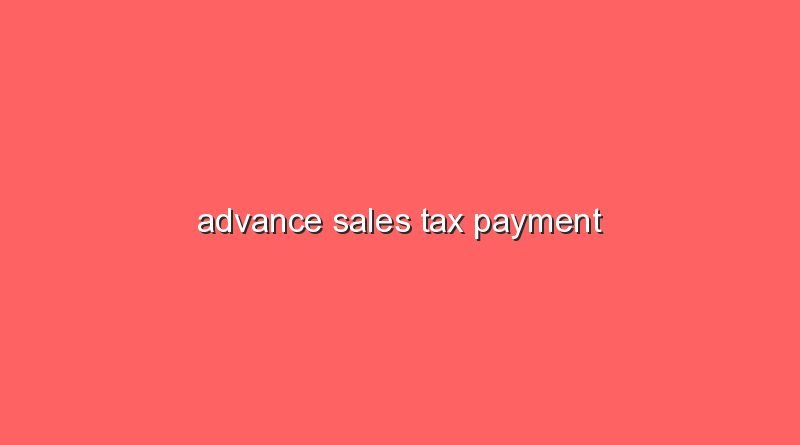advance sales tax payment

The sales tax prepayment is the payment of the sales tax collected by a company (equivalent to value added tax) to the tax office. As part of a so-called advance sales tax return, the company compares the taxes collected through its own work with the taxes paid for investments in the company. If there is a surplus, the corresponding amount must be transferred to the tax office as a sales tax prepayment by a specific date. However, if there is a tax minus, i.e. the company has invested more than it earned in the assessed period, it will get this difference back from the tax office. Such a reimbursement is the case with many companies, especially in the initial phase of founding a company – which shows the importance of the sales tax prepayment for your own financial planning.
Expiry of the sales tax advance payment
Companies registered in Germany are required to submit an advance VAT return according to clearly defined rules: In the year the company is founded and in the following calendar year, a newly founded company must make a monthly advance VAT payment or submit the necessary advance VAT return on a monthly basis. The reference date is always the tenth day of the following month. The advance sales tax payment for the month of January must therefore be made to the tax office by February 10th, or the advance sales tax return must be submitted by this date.
In order to give yourself some leeway for the preparation of the necessary income-expenditure statement and the submission of the advance sales tax return, it is advisable for company founders to apply for a so-called permanent extension of time at the tax office as soon as possible. This is usually granted without any problems and ensures that the submission period and the time for the VAT advance payment are postponed by one month. This means that the advance sales tax return for January would not be due until March 10th. In some cases, however, a special advance payment is due from the company in order to grant such a permanent extension, which amounts to 1/11 of the sum of the previous year’s sales tax advance payment. This special advance payment is repaid with the last advance sales tax return that a company submits.
After the first few years of business, most companies are switched to a quarterly cycle in the sales tax advance payment by the tax office. This means that the sales tax for income and expenditure from a calendar year quarter, i.e. three months, must be settled on the tenth of the month following this quarter. With a permanent extension of the deadline, the billing must only be available one month later and the payment of the sales tax owed must be made as sales tax advance payment.
The information on the advance sales tax return is transmitted electronically to the tax office – using the ELSTER software, which is mandatory for companies.
Preparation of the sales tax return
The sales tax advance payment – and thus the creation of a sales tax advance return – is a recurring task in a company’s accounting department. It is linked to the meticulous collection and documentation of all operational expenses and income. Since many types of expenses can have a deductible effect on the sales tax advance payment as a business justifiable investment, all receipts, from restaurant bills for customer appointments to material purchases and expenses for small and large customer gifts, should be collected using a system that is as intuitive as possible. Many smaller companies hand over the preparation of the sales tax advance return to a tax office due to the considerable effort involved in sorting and calculating the tax payments. All you have to do then is forward all receipts for expenses and all paid invoices from your customers to the office, which will take care of the entire calculation of the VAT advance payment.
If an advance sales tax payment is to be made, i.e. more income than expenditure, companies can transfer this payment either monthly or quarterly to the tax office – or grant the tax office a direct debit authorization. In this case, the amount due as advance VAT payment is automatically debited by the tax office at the right time after submission of the advance VAT return. In this way, it is possible to avoid falling into arrears in the hustle and bustle of everyday work – because the interest on arrears that the tax office charges in such a case is sensitive.
Incidentally, small entrepreneurs who are self-employed only as a sideline can be exempted from VAT liability. This means that you do not have to prepare a sales tax return and do not have to make a sales tax advance payment – however, you cannot have the sales tax paid for expenses reimbursed by the tax office.
Visit the rest of the site for more useful and informative articles!




